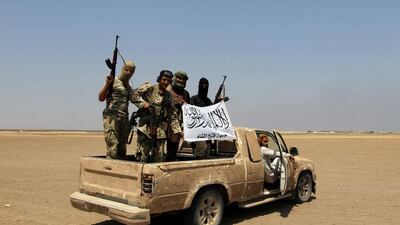BEIRUT // Rebel factions in Syria have said they were prepared to honour the ceasefire agreement due to take effect on Monday evening, despite deep reservations about its terms.
The groups wrote to the US on Sunday saying they would “cooperate positively” with the ceasefire. They said the agreement neglected besieged areas and called for aid to be taken to all those places without exception.
They also expressed concern at clauses in the agreement indicating that Syrian government jets would not be barred from flying until up to nine days after the ceasefire had taken effect.
The agreement, brokered by the US and Russia, is set to begin with a limited ceasefire starting at sundown on Monday and allows the Syrian government to continue to strike at Al Qaeda-linked militants until the US and Russia take over the task in one week’s time.
The arrangement divided rebel factions, who have depended on the might of an Al Qaeda-linked faction – Jabhat Fatah Al Sham, renamed from Jabhat Al Nusra after it said it was severing ties with Al Qaeda – to battle government forces around Aleppo.
The leader of at least one US-backed rebel faction has publicly called the offer a trap.
Earlier, a leader from the powerful Ahrar Al Sham militia announced that the rebels would observe the ceasefire, but would not fully split with Jabhat Al Sham.
“The Islamist factions and Jabhat Fatah Al Sham will abide by the ceasefire without publicly declaring it,” he said. “They will announce they are opposed to the US-Russian agreement.
“But they will halt their operations on the ground because of the losses they sustained in the battles for Aleppo.”
Other factions less closely tied to Jabhat Fatah Al Sham, including those backed by Turkish ground forces in the northern frontier area, would publicly commit to the agreement, the leader said.
“The free Syrian factions under the Euphrates Shield banner will announce their commitment to the agreement, of course,” he said.
The ceasefire has been accepted by the Syrian government and one of its main backers, Iran, and the Lebanese Shiite militia group Hizbollah.
Earlier yesterday, Ahrar Al Sham said it would not respect the ceasefire, which is meant to ease the country’s humanitarian crisis and pave the way to peace talks.
The group “is not bound by the truce and won’t abide by it”, because that would benefit the forces of president Bashar Al Assad, spokesman Abu Yousef Al Muhajir said.
The latest US-Russian agreement, unveiled on Friday after marathon talks in the Swiss city, reflected only the intentions of Washington and Moscow, Mr Al Muhajir said.
Syrian state news agency Sana on Saturday reported that the government had approved the agreement.
And the Iranian foreign ministry spokesman Bahram Ghasemi yesterday said Tehran also backed the deal.
Hizbollah, which has intervened on behalf of Mr Al Assad, gave its support for the ceasefire late on Saturday.
The deal reached by the US secretary of state John Kerry and Russian foreign minister Sergey Lavrov aims to initially halt fighting across the country for 48 hours. The ceasefire could then be renewed.
To get aid into the battered second city of Aleppo, where rebel-held areas are under siege by regime forces, a demilitarised zone is to be established around the Castello Road into the city.
If the truce holds for a week, the US and Russia will start joint operations against the extremist group ISIL and Jabhat Fatah Al Sham.
The US has also committed to severing the ties between Jabhat Fatah Al Sham, which Washington and Moscow still consider to be linked to Al Qaeda, and American-backed rebels fighting Mr Al Assad.
Rebels have been fighting alongside Jabhat Fatah Al Sham around Aleppo as they try to break a government siege that was reimposed this month.
It is not clear how the Syrian government will distinguish between the two, and whether it can strike at the Fatah Al Sham without hitting other rebels.
Aleppo has recently become the focus of the Syrian conflict, with nearly 700 civilians, including 160 children, killed in 40 days of fighting, according to a Syrian Observatory for Human Rights monitoring group.
Six civilians were killed in air strikes on Aleppo yesterday, it said.
Meanwhile, the death toll from air strikes launched on rebel-held Idlib city on Saturday rose to at least 62 people, including 13 women and 13 children, the Britain-based Observatory said.
* Bloomberg, Associated Press and Agence France-Presse

